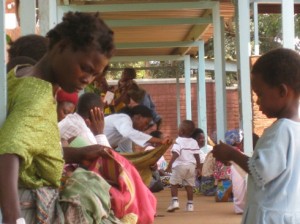Birth assistants allowed to encourage greater birth safety
Published on May 2, 2011 at 9:26 AM by FACE OF MALAWI

Mothers and their children wait to see nursing staff at Kawale Clinic, Lilongwe, Malawi. Image: Laura Lopez Gonzalez/IRIN
The lifting of the 2007 ban on TBAs still requires ministry of health approval, the issuing of guidelines, and consultation with stakeholders, but health practitioners say the president’s pronouncement “will now allow them [TBAs] to come back and operate openly”.
In 2004, the Malawi Demographic and Health Survey said the maternal and infant mortality rate was 984 per 100,000 live births, translating into 6,000 maternal deaths each year. The current estimate, collated from inter-agency projections, was 510 maternal deaths per 100,000 live births.
Mutharika said: “We need to train traditional birth attendants in safer delivery methods. We should not completely stop them, because their work is very important. We should train them to assist us in addressing the health challenges that we are facing.”
The rationale for the 2007 ban was that low-skilled TBAs were unable to identify obstetric emergency cases early enough. Delays caused by poor transport infrastructure and the paucity of medical facilities contributed to the high incidence of maternal deaths.
It was hoped that by preventing TBAs from practising, mothers would utilise the country’s medical facilities, but nearly half of all deliveries still occur outside medical facilities.
Underground
Dorothy Ngoma, executive director of the National Organisation of Nurses and Midwives in Malawi, said TBAs continued to exist because the health system failed to provide services.
She told the Nation, a daily national newspaper: “They [TBAs] never really stopped … What happened is that they went underground for fear of being fined a goat. So, in terms of statistics, we were losing out, as deaths and births from these people were not recorded”.
Ngoma said a system should be established for a two-year training course for midwives, and then the work of TBAs would wither as people recognised the benefits and availability of qualified medical personnel.
The World Health Organization estimates there are about two doctors and 59 nurses for every 100,000 people and that in 2006 the vacancy rate for nurses stood at about 65%. About 59% of Malawi-born physicians were practising outside the country.
The statistics further mask the skewed distribution of health infrastructure, which is concentrated in urban areas even though about 70% of the national population of 15 million live in rural areas.
Two weeks’ training
Victor Chinyama, Malawi spokesman for the UN Children’s Fund, told IRIN that TBAs had about “two weeks’ training, probably less”, when ideally training should be for about three months “so they [TBAs] are able to recognise at an early stage any [birth] complications”.
He said the links between TBAs and health services had to be strengthened, and communications improved with clinics so that they were able to respond to emergencies, for example by using motorcycle ambulances (a motorcycle fitted with a stretcher on a sidecar).
Chinyama said about 90% of women in Malawi attend their first ante-natal clinic at three months, and “after that you never see most of them again”.
Adamson Muula, a lecturer in community health at the Malawi College of Medicine in the country’s second city, Blantyre, said: “If government plans not to use TBAs any more, then a safe alternative must be identified. In many cases, not all women, even if they wanted to, would end up delivering at hospital. Again, if just 70% of all pregnant women were to deliver at hospital, the hospital system would not cope.”
Reactions
Ernest Mngoni Mahwayo, a resident in the capital Lilongwe, said TBAs were part of Malawian society. “Not many families can afford to have babies delivered in good hospitals. Those that make it to hospitals have to stay for days, and that means they have to fend for themselves. These women find it cheaper to deliver in their villages, where a TBA will attend to them.”
Miriam Chimbalanga, a mother of two living in Chiradzulu, a town near Blantyre, said: “It was a TBA who helped me deliver my second child. I know of several women who have delivered all their children with the assistance of TBAs. It’s good to hear that they can now practice without fearing anyone.”
Constance Milanzi, a mother of three living in Lilongwe, told IRIN: “There should be a deliberate policy to force every TBA to undergo training. More women are dying because they find themselves in the hands of people who do not know the basics of safe motherhood.”
_______________________________________
IRIN/GdnDevNetwork
©Women News Network – WNN


